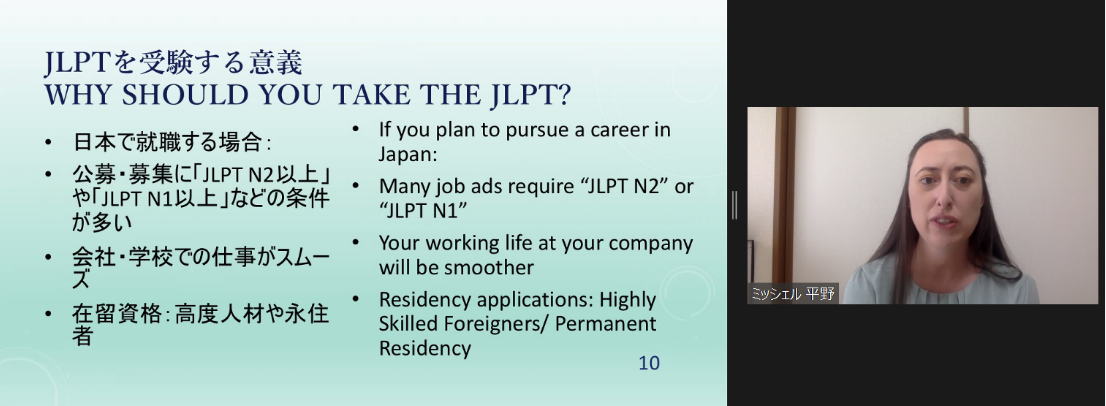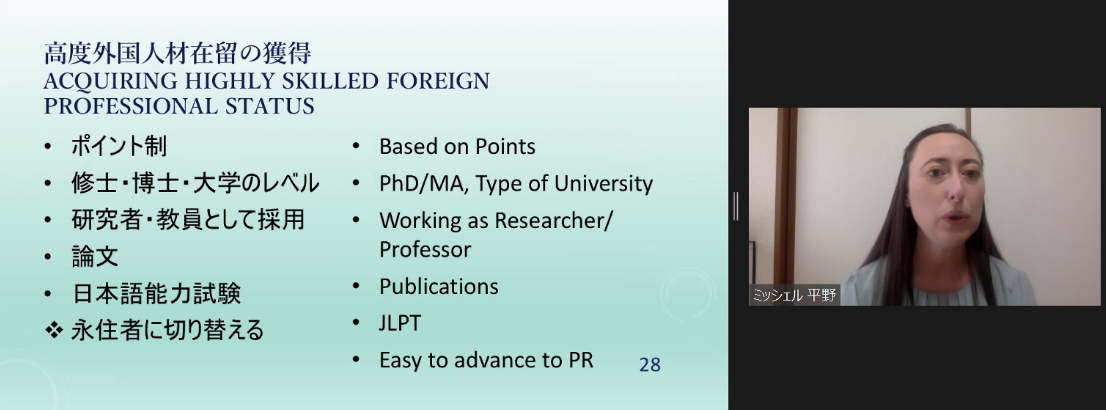(English follows Japanese.)
2022年9月27日、第144回コンソーシアム人材セミナー「高度外国人材の日本におけるキャリアパス拡大と日本語の習得(2回目)」をオンライン(Zoom Meeting)で開催しました。
【講 師】安田女子大学 平野 ミッシェル 氏
【参加者】21人
概要
本講演会では、博士研究と日本語能力を生かして日本で活躍する高度外国人材・平野ミッシェル氏(博士(文学))を講師にお迎えした。日本に滞在する高度外国人材にとって、日本語能力は、日本で研究者として成長し、活躍するために欠かせないものであることが、実体験をもとに語られた。
平野氏は、母国のアメリカ合衆国と日本の大学院において日本文学を専攻し、日本の王朝物語作品の人物研究に取り組んだ。日本語学習はカリフォルニア大学サンタバーバラ校の学部在学中に開始して、卒業後に渡日して日本の愛知県岡崎市の日本語学校に入学。日本語の集中コースを受講した。その後帰国して、カリフォルニア大学ロサンゼルス校の修士課程に進学。修了後には再度渡日して名古屋大学院文学研究科(現・人文学研究科)博士前期課程に入学し、博士後期課程でも学んだ。名古屋大学での授業や議論、指導教員とのやり取りは全て日本語で行われた。2012年にはJLPT N2試験に合格。翌2013年にはN1試験に合格した。
大学院を単位取得満期退学し、引き続き日本で博士学位論文の執筆を続けようとしたところ、「学生」の在留資格が無効となることに気づいて就職活動を開始。研究・教育に関する求人情報を掲載するJREC-IN Portal(https://jrecin.jst.go.jp/seek/SeekTop)で母校の国際機構で留学生支援を本務とする求人を見つけて応募し、2014年に同センターに着任。留学生の入試や就学生活支援、受け入れ制度の見直しなど、多言語による幅広い業務を担当した。
就職後も文学研究を継続。2018年3月に名古屋大学から博士(文学)号を授与され、2019年4月、安田女子大学日本文学科に助教として着任した。現在は、日本人学生を対象に、日本語で日本文学・文化についての講義や論文指導を行っている。研究では、JSPS科研費「研究活動スタート支援」と「若手研究」に採択されて、アメリカ合衆国に顕在する日本の古文書古典籍の調査を行うなど、彼女ならではの研究活動を展開している。
N2以上の語学力は、採用後の業務遂行や高度人材の在留資格や永住権の獲得のために有益である。学位取得後に帰国を予定している場合でも、日本語能力を身に着けていれば、母国における就職のチャンスは広がるだろう。一方で、高度外国人材であっても、JLPT N2以上の語学力を備えていなければ、応募可能な求人数は限られる。日本に留学したのに日本語が話せなければ、「日本に留学したのに、なぜ?」などと、周囲から疑問を持たれるかもしれない。
日本での就職や研究を目指す高度外国人材には、ぜひ日本語を勉強して欲しい。日本語能力はいつ・どこで役に立つか分からない。日本でも海外でも、日本語能力を生かしてチャンスをつかみ、高度な知見や才能を生かして活躍して欲しい。
-------------------
Seminar Report: Expansion of Career Paths for Highly Skilled Foreign Human Resources in Japan and their Acquisition of Japanese Language, #2/2
The 144th Jin-Zai Seminar, "Expansion of Career Paths for Highly Skilled Foreign Human Resources in Japan and their Acquisition of Japanese Language (#2/2)", was held online (Zoom Meeting) on September 22, 2022.
Speaker:Dr. Hirano Michelle
(Doctor of Literature, Yasuda Women's University)
Number of participants: 21
■Seminar Summary
This lecture featured Dr. Hirano Michelle, Doctor of Literature, an advanced foreign human resource currently working in Japan, utilizing her highly academic research skills and Japanese language proficiency. Based on her own experience, she spoke about how Japanese language skills are essential for advanced foreign human resources staying in Japan to improve as an active researcher in Japan.
Dr. Hirano began her Japanese language learning while an undergraduate at the University of California, Santa Barbara, in her homeland, and moved to Japan to enroll in a Japanese language school in Okazaki, Aichi, where she took an intensive course in the Japanese language before studying classical Japanese literature in the master's program at the University of California, Los Angeles (UCLA). She later entered the Graduate School of Humanities at Nagoya University. She majored in Japanese Classical Literature and worked on character studies of classical tale literature. All classes, discussions, and communication with her academic supervisor were conducted in Japanese. In 2012, she passed the JLPT N2 exam, and in 2013, she successfully reached the N1 level.
After completing her graduate school credits, she attempted to continue writing her doctoral dissertation in Japan. However, her "Student" status of residence would be invalid after completing the required credits, so she started job hunting. She found a job opening on JREC-IN Portal (https://jrecin.jst.go.jp/seek/SeekTop) as a lecturer in charge of international student support at the International Education & Exchange Center, Nagoya University and applied for it. In 2014, she was appointed to the Center to deal with a wide range of multilingual tasks, such as admissions, support for studying and living, and a review of the acceptance system for international students.
She continued her doctoral research after she started working and was awarded her Doctor of Literature degree from Nagoya University in March 2018. In April 2019, she joined the Department of Japanese Literature at Yasuda Women's University as an Assistant Professor. She teaches Japanese students about Japanese literature and culture in Japanese and supervises their research papers. As for her research, her unique research activities attract much attention in the academic society: she was accepted for both JSPS Grant-in-Aid for Research Activities Start-Up as well as JSPS Grant-in-aid Young Scientists to research Japanese archives and classical manuscripts in the United States of America.
Japanese language proficiency of N2 or higher is beneficial for performing work after employment and obtaining the Advanced Human Resources Residence or Permanent Residency status in Japan. Even if you plan to return to your homeland after receiving a degree, Japanese language proficiency might increase your chances of finding a job there. On the other hand, although you are highly-educated, if you do not have JLPT N2 or higher language proficiency, the number of job openings you may apply for in Japan is limited. Also, when you return to your homeland, people might ask you questions such as, "Why can't you speak Japanese if you studied in Japan?"
Dr. Hirano encouraged participants seeking employment or research in Japan to learn Japanese. There is no telling when or where your Japanese language skills might become beneficial. Whether in Japan or overseas, we hope you will seize the opportunity to utilize your Japanese language skills to make the most of your high-level knowledge and talents.


【お問い合わせ先 / Contact Information】
広島大学グローバルキャリアデザインセンター(担当 田中) / Global Career Design Center, Hiroshima University (TANAKA)
E-mail:wakateyousei(AT)office.hiroshima-u.ac.jp
*(AT)は半角の@に変換してください。 / Please replace (AT) with @.
TEL:082-424-4564

 Home
Home
